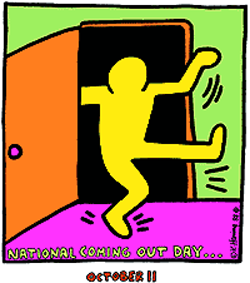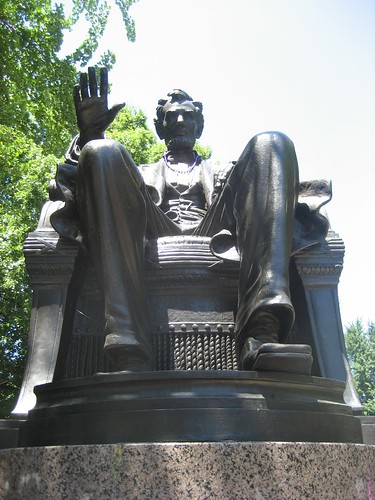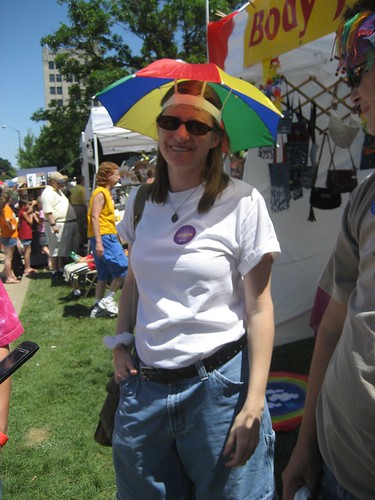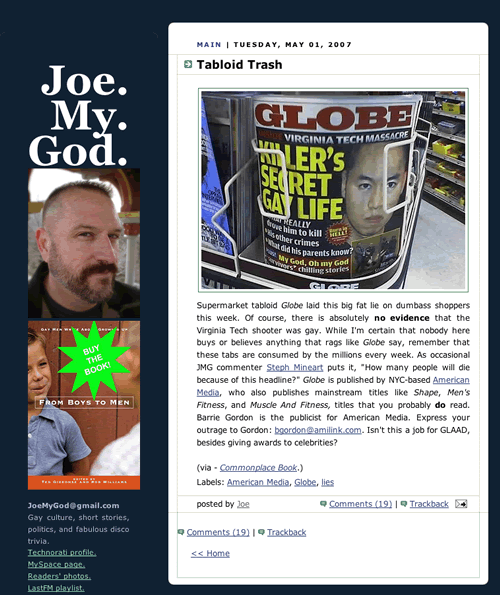A couple of posts down, I answered a meme wherein I mentioned that I “have some gender identity things I don’t talk about much.” To that post, one of my former co-workers added a comment.
When I initially read it, I deleted the comment. It’s been a very draining weekend, and I thought the post was antagonistic, and I really didn’t want to deal with it. I also didn’t want to let it stand, because I have a site comment policy that I enforce.
But it was also unfair enough, and full of so many unjust assumptions that I changed my mind and decided I’d better address it, for better or worse.
The text of the comment:
Gender Identity issues??? Well no Duh!
You know what they say Steph; those who protest the loudest have the most to hide and you aren’t any different. You treated me with complete disrespect and rejection when I transitioned at work 4 cubes away from you for over a year. At a time when I needed friends and support, you wouldn’t even talk to me, not a kind or supportive word EVER. You could have been a huge help and a valuable ally, but obviously you were hiding behind your own issues and didn’t want to muddy your internal gender puddle.
You know what? I get it, I understand. I wish I would have made the connection then instead of catching it in a brief comment on your blog which I read occasional. (It is one of the better Hoosier-made blogs, so kudos to you.) Had I known, or had I been in a position to get outside my own issues at the time, at least it would have dulled the feeling of rejection I felt.
I doubt you will, but should you want an ear for those gender identity issues, I’m here and more than willing to listen.
Janie
I’m not sure where to start, but let me dive in.
1. My own gender identity.
LET ME BE REALLY CLEAR because I’ve been through this discussion before, and had people try to tell me I don’t know my own mind. And anyone who reads my writing knows that’s the one thing that sends me into a blind, frothing rage. I hate it when people try to tell me what I think. I’m the most introspective person you or I know, and no one has examined what I think more carefully than me.
I am not interested in transitioning to a man. I’m happy with my body in it’s current configuration. I’ve been openly gay for over 20 years, and if I were interested in being a man, I would have arrived there 15 years ago.
What I’m not comfortable with is society’s expectations and prescribed role for me – primarily involving (but not exclusive to) clothing that is traditionally considered women’s clothing.
I don’t like dresses on me, and will not wear one. I’m not comfortable in a dress or a skirt and don’t like the way they look on me. I hate the way women’s shoes look and feel on my feet. I don’t like purses. I don’t like the colors, styles or cuts of women’s blouses or tops on me. I like to wear clothes that are comfortable to me. I like to wear men’s clothes. I like to wear men’s shoes.
I also have issues with what society expects from women when it come to occupations, behaviors and attitudes.
When I said my “gender identity things” I definitely DID NOT MEAN that I’m confused or have doubts about who I am or how I feel. The “issue” I have is with society, not with myself.
And I AM NOT ALONE in how I feel. There are LOTS of lesbians in the same shoes I am in – breaking gender lines without being trans. Wanting to change what women can do and be without transitioning into men.
This is wholly and completely different from the feelings and desires of female to male trans men, and the distinction is at the heart of some extremely emotional and very hostile clashes between the lesbian and trans communities.
These hostile clashes are one of the reasons I’m not comfortable bringing up gender identity on this blog – because one of the people I like and admire – my friend Marti Abernathey – is a a trans advocate, and I really like her, and don’t want to have difficult discussions with her. I’d much rather avoid the conversation, because there are things I disagree with in some of her positions, and I value her friendship and don’t want to argue when there’s so much we do agree on.
The other reason is because I don’t want to have this sort of conversation in front of my mother, whom I love very much, but who is, I’m sure, very uncomfortable at this topic right now, because she reads my blog regularly. My mom has come a very long way since I came out 20 years ago, but there are still areas where we have things to talk about, and I’d prefer do that in person with her and not here, because she deserves that respect.
2. My experience with trans people.
I have a friend who transitioned from male to female in college, (circa 1987) amidst great hostility and at a time when people REALLY didn’t know or understand much about gender identity issues. I listened to Rachel’s explanations about how she felt, sympathized with her in the fear she felt at the hostility she went through, tried not to add anything to the burden that got heaped on her, and actively defended her to other people as she gradually changed into the person she really felt she was.
I think she’s an amazing, strong and expressive person. We haven’t always agreed over the years because we have very different personalities, but I like her, and admire her for surviving all the crap she had to deal with in order to find her true self. I still see her a couple of times a year, usually at the holidays, and it seems she’s become a happy and truly joyful woman, and I can’t picture her as anything else.
Over the years I’ve become friends with several other trans people and also have the privilege of working with trans advocates on political issues and efforts.
I have also had numerous conversations with trans people and with lesbians and gay men about gender issues, and especially have had some difficult conversations with a few trans people who seem to believe that all “butch” lesbians have just not discovered their inner man and who are convinced I’m going to transition at some future date that I just haven’t realized. I’m not sure why a few people are so rigid in the other direction than societal norms in their beliefs, but those people exist and can be very vocal.
I don’t know if that’s what you’re saying, Janie, but it sure seems that you comment is making that assumption.
3. My workplace.
Before Janie came along, there were two other people who transitioned from one sex to another in our workplace. As far as I know, they both did so without problems, and were treated with respect and consideration. I wasn’t close friends with either of them, but in the few conversations we had, they said that their transition was supported by active participation from human resources. I never heard them complain about how other people in the company treated them, and I never heard anything against them from anyone else. Now that’s not to say things didn’t happen – just that I never heard about it. But I’ve always been openly gay at work, so it’s possible that people made sure nothing came to my ears.
When it comes to my own experiences with being openly gay at my current workplace, I’ve always felt supported. Hell, I CAME to the company in 1994 specifically because they had sexual orientation and gender identity in the EEOC clauses, and other gay people advertised it as a welcoming place to apply. After being fired from a job for being openly gay and dealing with another that was hostile to gay people, working at a welcoming workplace was a priority for me.
3. My experiences with Janie.
First of all, Janie… I regularly, openly defended your transition and challenged people’s beliefs about gender identity when you came up in conversation. I did this partly because you came up quite a bit, and partly because I was approached by human resources and asked to speak out on your behalf if I heard people making inappropriate or discriminatory remarks, and to let them know if I thought there was a problem.
In my discussions with co-workers, the issue wasn’t specifically your transition – it was other personality issues that got packaged with you transition, and I strove to separate those and point out that if someone had a problem with you, they should address the problem and not take cheap shots at your transition. All of the people I talked to were able to sort that out in their minds. Some took longer to get there.
About you and me personally – Not one kind word? What? I had conversations with you, Janie. I spoke to you, said hi to you, I wasn’t in anyway disrespectful or unkind.
On the other hand – bluntly – I just don’t like you. I’m sorry, but there it is. There were things you did and said that bothered me, and it had nothing to do with you transition, or my feelings about my gender or yours. It was just you. So yes, there were times when I wasn’t warm or welcoming. I’m sorry, but I’m not going to go into specifics on my issues with you here or anywhere else.
I did and do have an obligation to defend your status in a minority group – one that I took up unhesitatingly. But the reality is that we just don’t have to be BFF with everyone just because we’re in minority groups that deal with the same issues. Some people just have different personalities, and you and I are two of those people.







